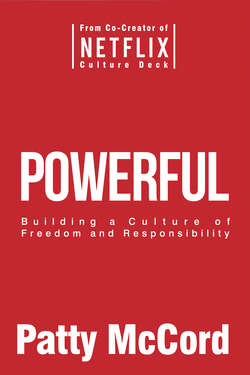Читать книгу Powerful - Patty McCord - Страница 12
На сайте Литреса книга снята с продажи.
Policies and Structure Can’t Anticipate Needs and Opportunities
ОглавлениеIf you look at the most successful companies of the last decade or so, many of them are Internet firms with teams that work very collaboratively and organically. What do I mean by organically? I mean their goals and the ways they allocate time and resources, as well as the problems they’re focusing on and approaches to solving them, are constantly adapting to the demands of the business and customer. They are growing, changing organisms. They aren’t rigid structures bound by predetermined mandates about objectives, staff, or budget.
Before Netflix, I worked for Reed at Pure Software, which was my first start-up job, and I felt like I’d died and gone to heaven. I loved the high energy and the intense focus on innovation. As the head of HR, I still introduced policies and procedures, but I began doubting the conventional wisdom. Because the company was so much smaller than others I’d worked at, I began to learn more about the nitty-gritty of the business, and I could get to know more employees. As I became familiar with software engineers, in particular, and observed how they work, I realized that it’s a misconception that more people make better stuff. With our teams at Pure, and all around Silicon Valley, I could see the power of small, unencumbered teams.
The typical approach to growth in business is to add more people and structure and to impose more fixed budgetary goals and restraints. But my experiences at fast-growth companies that successfully scaled showed me that the leanest processes possible and a strong culture of discipline were far superior, if for no other reason than their speed.
Later, at Netflix, we had a striking realization about this after we had a big, very painful layoff. In 2001 we had to lay off a third of the company. The dot-com bubble had burst, and the economy had gone bust with it, and we were on the brink of bankruptcy. It was brutal. Then that Christmas the cost of DVD players dropped and they became the big gift, and the business took off. Now we had to do twice the work with two thirds the people. We couldn’t hire anybody except people to put DVDs in envelopes. We had so many new customers that we didn’t have enough inventory, and we had to put every tiny cent of profit we had into buying more product. And yet everyone was much happier. I was carpooling to work with Reed one day, and I said to him, “Why is this so fun? I can’t wait to get to work. I don’t want to go home at night. We’re working so hard, but it’s great. What is it about what we’re doing?” He said, “Let’s figure it out.”
Our first big realization was that the remaining people were the highest performers, and it taught us that the best thing you can do for employees is hire only high performers to work alongside them. It’s a perk far better than foosball or free sushi or even a big signing bonus or the holy grail of stock options. Excellent colleagues, a clear purpose, and well-understood deliverables: that’s the powerful combination.
